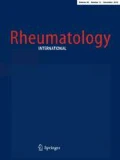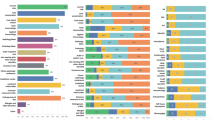Abstract
The objective of the study was to analyse resources for rheumatology training, and speciality certification and recertification requirements in Argentina. Information was gathered regarding vacancies, entry requirements, duration and validity of the specialist degree in every residency and postgraduate course in adult rheumatology. The following aspects were analysed: monitoring authority, certification and recertification requirements, and mandatory recertification. Six out of 36 universities offer rheumatology postgraduate courses. Out of 65 vacancies, 36 (55%) are implemented by a National Public University in the Autonomous City of Buenos Aires (CABA), and 46 (70%) are in CABA. There are 32 vacancies for rheumatology residencies in 7 out of 24 districts, 16 of them (50%) in CABA. There are 2- to 3-year postgraduate courses; entry requirements range from 1-year experience in internal medicine to either complete residency or specialist degree in internal medicine. Training formats vary from full-time university residency to either university-based courses with part-time dedication in a rheumatology service without residency or non-university courses with part-time dedication. Not every specialist degree is automatically homologated in every jurisdiction. Provincial governments and colleges of physicians are the certification and recertification authorities; medical school was included in one district. Recertification is mandatory in only 8 districts; 40–50% of the process is achieved by merely practising as a rheumatologist. Most of the training resources are concentrated in CABA. Although there are various options, not all of them are automatically homologated. Recertification is not mandatory nationwide, and a significant part of the process involves practising as a rheumatologist.
Similar content being viewed by others
References
Panush RS (2011) Why Rheumatology and the Care of Patients with Rheumatic Diseases are Important, Interesting, and Exciting. The Rheumatologist. https://www.the-rheumatologist.org/article/rheum-with-a-view-5/?singlepage=1 Accessed 27/04/19.
Deal CL, Hooker R, Harrington T, Birnbaum N, Hogan P, Bouchery E, Klein-Gitelman M, Barr W (2007) The United States rheumatology workforce: supply and demand, 2005–2025. Arthritis Rheum 56(3):722–729
American College of Rheumatology (2019) Que es un Reumatologo? https://www.rheumatology.org/I-Am-A/Patient-Caregiver/Health-Care-Team/Que-es-un-Reumatologo Accessed 27/04/19.
Glorio R, Carbia S (2014) Historical and legal analysis of the medical residencies and resident. Dermatol Argent 20:67–71
Especialidades Medicinales (2006) Resolución Ministerio de Salud de la Republica Argentina 1923/06. https://www.argentina.gob.ar/normativa/nacional/resoluci%C3%B3n-1923-2006-123043 Accessed 14/08/19.
Anexo 10 (2009) Especialidades profesionales. Ejercicio Profesional. Profesiones de grado universitario: Especialidades DNRSCSS-SSPRF-SPRI. https://www.msal.gob.ar/images/stories/cofesa/2009/acta-02-09/anexo-10-especialidades-profesionales-02-09.pdf. Accessed 15/8/19.
Silverman F (2010) Educación médica de posgrado. Residencias médicas. Rev Asoc Argent Ortop Traumatol 75:88–96
Observatorio Federal de Recursos Humanos en Salud (2015) Ministerio de Salud. Presidencia de la Nación. Los recursos humanos de Salud en Argentina. https://www.argentina.gob.ar/salud/oferhus/datos/informesydocumentos Accessed 3/6/18.
Ministerio de Salud y Desarrollo Social de la Republica Argentina (2015) Regulación del ejercicio profesional. Especialidades. https://www.argentina.gob.ar/salud/oferhus/formacion/regulacion-ejercicio-profesional#2. Accessed 15 Aug 2019
Colegio de Médicos de la Provincia de Buenos Aires (2018) Reglamento para solicitud de Especialidades y Recertificaciones. https://www.colmed5.org.ar/sitio/tramites/. Accessed 15 Aug 2019
Williams G, Duré I, Dursi C (2013) Médicos en Argentina. Red Federal de Registros de Profesionales de la Salud. Direccion Nacional de Regulacion Sanitaria y Calidad de Servicios de Salud-MS. Observatorio Federal de Recursos Humanos en Salud, Ministerio de Salud de la Nación, Argentina. https://www.argentina.gob.ar/salud/oferhus/docs-interes/fuerza-de-trabajo#1. Accessed 15/08/19.
Navarro Pérez P, Contreras Sánchez AJ, Junco Gómez MC, Sánchez Villegas P, Sánchez-Cantalejo Garrido C, Luque Martin N (2015) Análisis de la distribución geográfica de médicos especialistas en la Republica Argentina. Escuela Andaluza de Salud Pública. Organización Panamericana de la Salud. Ministerio de Salud de la Nación Argentina. https://www.argentina.gob.ar/salud/oferhus/docs-interes/fuerza-de-trabajo. Accessed 15/8/19
Ugarte-Gil M, Silvestre A, Pons-Estel B (2015) Access to an optimal treatment. Current situation. Clin Rheumatol 34(1):S59–S66. https://doi.org/10.1007/s10067-015-3018-7(Epub 2015 Jul 19)
Fara N, Sequeira G (2016) Rheumatology resources in a region of Buenos Aires Province, Argentina. J Clin Rheumatol 22(5):260–263. https://doi.org/10.1097/RHU.0000000000000391
Falasco SI, Falasco MA (2018) Formación de especialistas en Latinoamérica: Argentina. EducMed 19(S1):4–11
Al Maini M, Al Weshahi Y, Foster HE, Chehade MJ, Gabriel SE, Saleh JA et al (2019) A global perspective on the challenges and opportunities in learning about rheumatic and musculoskeletal diseases in undergraduate medical education: white paper by the World Forum on Rheumatic and Musculoskeletal Diseases (WFRMD). Clin Rheumatol. https://doi.org/10.1007/s10067-019-04544-y(Epub ahead of print)
de Albuquerque CP (2014) Inequality in the distribution of rheumatologists in Brazil: correlation with local of medical residency, Gross Domestic Product and Human Development Index. Rev Bras Reumatol 54(3):166–171
PNUD Argentina (2017) ¿Cómo están la Argentina y las provincias en los rankings de desarrollo? https://www.ar.undp.org/content/argentina/es/home/presscenter/articles/2017/05/12/-c-mo-est-n-la-argentina-y-las-provincias-en-los-rankings-de-desarrollo-.html. Accessed 3/12/19
Albuquerque CP, Dos Santos-Neto LL (2017) Development of rheumatology training in Brazil: the option for a medical residency program. Rev Bras Reumatol Engl Ed 57(6):507–513. https://doi.org/10.1016/j.rbre.2016.04.001(Epub 2016 Apr 29)
Maceira D, Cejas C (2010) Recursos humanos en salud: una agenda para el gobierno nacional. Documentos de Políticas Públicas. Recomendación Nº82, CIPPEC, Buenos Aires. https://www.cippec.org/?s=Recursos+humanos+en+salud%3A+una+agenda+para+el+gobierno+nacional&pt=&tag=&category=&date=. Accessed 30/10/19
Sivera F, Ramiro S, Cikes N, Cutolo M, Dougados M, Gossec L et al (2016) Working Group on Training in Rheumatology across Europe. Rheumatology training experience across Europe: analysis of core competences. Arthritis Res Ther 18(1):213
Battafarano DF, Ditmyer M, Bolster MB, Fitzgerald JD, Deal C, Bass AR et al (2018) 2015 American College of Rheumatology Workforce Study: supply and demand projections of adult rheumatology workforce, 2015–2030. Arthritis Care Res (Hoboken) 70(4):617–626. https://doi.org/10.1002/acr.23518
Unger J, Putrik P, Buttgereit F, Aletaha D, Bianchi G, Bijlsma JWJ et al (2018) Workforce requirements in rheumatology: a systematic literature review informing the development of a workforce prediction risk of bias tool and the EULAR points to consider. RMD Open 4(2):e000756. https://doi.org/10.1136/rmdopen-2018-000756(eCollection 2018)
Sobre a Sociedade Brasileira de Reumatologia (2019) https://www.reumatologia.org.br/institucional/sobre-a-sbr/. Accessed 13 Dec 2019
Neira O (2018) Exigencias para la Formación en Reumatología. Rev chil Reumatol 34(2):45–46
Heinze-Martin G, Olmedo-Canchola VH, Bazán-Miranda G, Bernard-Fuentes NA, Guízar-Sánchez DP (2018) Los médicos especialistas en México. Gac Med Mex 154:342–351
Akaki Blancas JL, López BJ (2018) Formación de médicos especialistas en México. Educ Med 19(S1):36–42
Cristina Coello. Ecuador necesita más reumatólogos (2015) Redacción Médica. 31/12/15. https://www.redaccionmedica.ec/secciones/profesionales/ecuador-necesita-m-s-reumat-logos-86965. Accessed 13 Dec 2019
Vargas P, Cabrera H, Montalvo J, López NR, Pacheco ER, Yuruhán D et al (2016) Analisis comparativo de la certificación, recertificacion y acreditación en Latinoamerica para la especialidad de Medicina Familiar y Comunitaria. Rev Bras Med Fam Comunidade 11(Suppl 1):61–70. https://doi.org/10.5712/rbmfc11(1)1275
Reveille JD, Muñoz R, Soriano E, Albanese M, Espada G, Lozada CJ, Montúfar RA, Neubarth F, Vasquez GM, Zummer M, Sheen R, Caballero-Uribe CV, Pineda C (2016) Review of current workforce for rheumatology in the countries of the Americas 2012–2015. J Clin Rheumatol 22(8):405–410
Bustamante ZM (2019) Recertificación de especialidades medicas de CONACEM. Rev Chil Reumatol 35(1):28–30
Consejo Mexicano de Reumatología (2019) Criterios para la evaluación curricular. Agosto. https://consejoreumatologia.org/formato-de-valor-por-puntuacion/. Accessed 13/12/19.
Salinas CAA, Ramos VP (2015) La certificación del Reumatologo, experiencia en Mexico. Acta Reumatologica (2) 1:6. https://doi.org/10.3823/1319
Acknowledgements
The authors wish to thank Professor Ana Insausti for her cooperation in the translation of this research paper.
Funding
This research received no specific grant from any funding agency in the public, commercial, or not-for-profit sectors.
Author information
Authors and Affiliations
Contributions
MLM, GS, NF, LA, MA, NE took part in the conception and design of the study; MLM and GS took part in the data management and analysis. All the authors wrote the article, approved the final manuscript as submitted, and agreed to be accountable for all aspects of the work.
Corresponding author
Ethics declarations
Conflict of interest
The authors declare that they have no conflict of interest.
Ethical approval
This article does not contain any studies with human participants performed by any of the authors, and the information analysed was in the public domain, authorisation from the Ethics Committee was not requested.
Additional information
Publisher's Note
Springer Nature remains neutral with regard to jurisdictional claims in published maps and institutional affiliations.
Rights and permissions
About this article
Cite this article
Micelli, M.L., Sequeira, G., Fara, N. et al. Description of the resources for rheumatology training and speciality certification and recertification requirements in Argentina. Rheumatol Int 40, 243–249 (2020). https://doi.org/10.1007/s00296-019-04505-3
Received:
Accepted:
Published:
Issue Date:
DOI: https://doi.org/10.1007/s00296-019-04505-3




